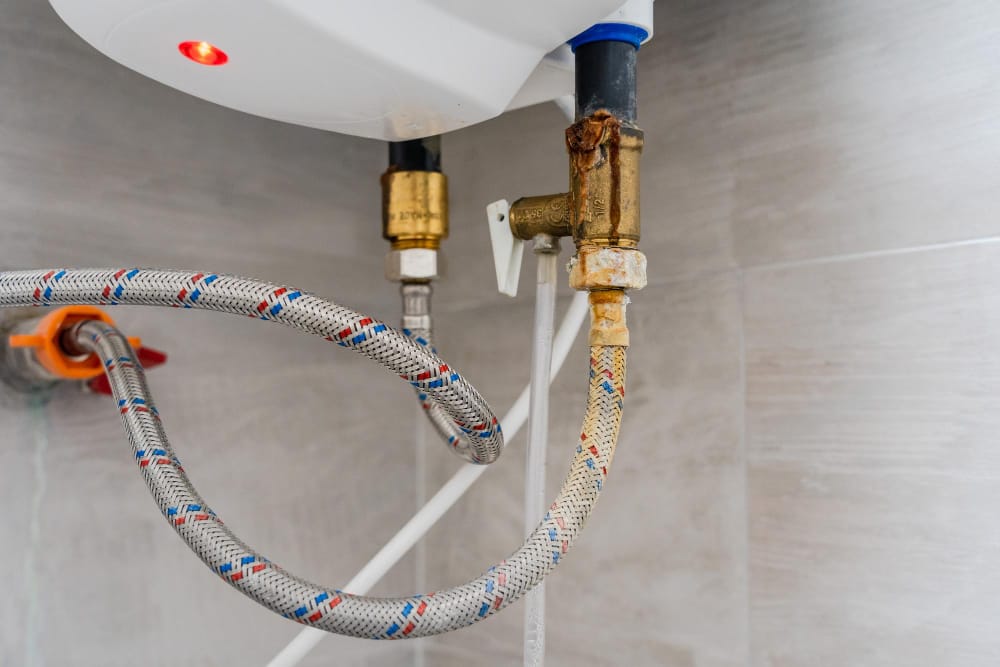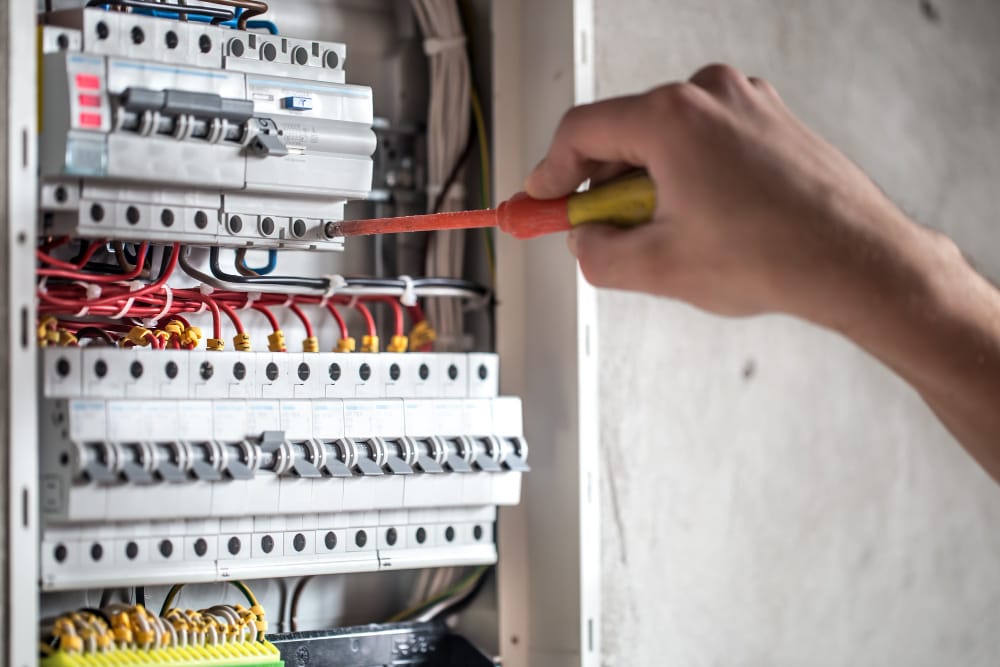One of the most vital appliances in our home is the water heater. We rely on it daily for hot water it provides for showers, washing clothes, running our dishwashers, and much more.
There are many types of water heaters. There are electric water heaters and gas water heaters, in both storage tank and tankless designs. Whatever type of water heater you have, you want it to provide you with a reliable source of hot water.
So, if your water heater isn't operating at peak efficiency or if it has experienced a failure, you'll want to do what's necessary to ensure a supply of hot water.
That may mean having repairs done on your existing hot water heater, or purchasing a new water heater. In this article, we'll look at some signs that your water heater needs to be repaired or replaced.
Understanding your water heater - its functions and potential trouble points is a good first step in helping you in making decisions. In this article, we'll examine three key points.
Understanding common points of failure for a water heater.
Warning signs of trouble for a water heater.
Evaluating whether to repair or replace your water heater.
In addition, we'll examine some basic differences between the two main different types of water heaters - tank and tankless water heaters. Let's dive in!
Hot water heaters are fairly simple systems, so the number of problems that can occur is limited. That's cold comfort when all you have is cold water to use, but it does make diagnosing problems a bit easier.
Most failures fall within a few categories. Let's take a look at three of the most common failures.
It's a homeowner's worst nightmare. A leak in your storage tank water heater can flood your home with a lot of water, potentially causing a lot of damage along the way.
The very design of the storage tank water heater creates the potential for this disaster. Storing large amounts of water in a tank without proper maintenance can lead to corrosion and the eventual failure of the tank. To prevent this, flushing the tank regularly is an important part of water heater maintenance.
A water tank failure isn't the only possible cause of a leak.

A common complaint with water heaters is that there is a short supply, or complete lack, of hot water. With electric water heaters, this can usually be traced back to a faulty heating element. Electric water heaters will have two heating elements in the tank, one at the bottom, and one higher up in the tank. They operate in tandem to warm the contents of the storage tank consistently.
If one of these elements fails, the water from the tank will be warmed inconsistently, resulting in a shortage of hot water.
Replacing heating elements is a relatively simple task, and your water heater will be back up to speed quickly once the faulty element is replaced.
With gas water heaters, low temperatures may be a sign of a gas line blockage that is restricting the flow of gas to the burners. This should be checked by a qualified technician.
There are some other telltale signs that your water heater may have seen better days. Since you don't want to find yourself without hot water unexpectedly, keep an eye out for these tell-tale signs.
If the pilot light on your gas water heater keeps going out, the problem is probably related to the thermocouple, the "brain" of your water heater.
The thermocouple will close the gas valve leading from the propane or natural gas line when it senses the pilot light is off. If it is closing the gas valve unnecessarily, it may be dirty, have a kink in the gas hose, or it may need to be replaced.
Electric water heaters usually use two heating elements to heat and keep the water hot. These shouldn't run at the same time, so a tripping circuit breaker is usually a sign that the water heater's thermostat has gone bad.
This failure can cause both heating elements to run at the same time, drawing more current than the breaker is designed to handle. A thermostat replacement is usually the solution to this problem.

If you turn on the hot water tap and see rusty or discolored water coming out, you've got a problem. The interior of storage water heaters is prone to corrosion and rust over time. It doesn't matter whether it is a gas water heater or an electric water heater, the interior can rust, leading to rusty water and providing a sure sign that it's time to replace your water heater.
Once you realize that you've got a problem with your water heater, you've got to face an important question: Do you replace a water heater or go for a water heater replacement?
In some cases, the answer is obvious. If your water heater tank has rusted through, replacement is the obvious answer. But in many cases, the answer to the question isn't as clear-cut, and the answer can depend upon many factors. We'll look at some of those factors now.
The age of your water heater is a big factor to consider when you're thinking about water heater replacement. Most sources agree that a conventional tank-type of water heater has a life span of between 8-12 years. Tankless water heaters do a bit better. They will typically last for about 20 years.
This is important when considering water heater replacement. Even if the repair cost is relatively low, you may be better off purchasing a new water heater if the current water heater is nearing the end of its lifespan.
Think of your water heater in the same terms as your car. After all, putting a new engine into an old car might not be a smart move, if other parts are going to fail. The same logic applies to water heater replacement costs.
Over time, water heaters and other appliances have become increasingly efficient. And you may find that you're getting more cold water than hot water when you turn the tap on - a sure sign that your existing water heater isn't doing the job it used to.
Gas water heaters and electric water heaters now use less energy to heat water and keep water hot than they did even a few years ago. This improved energy efficiency can factor into your decision.
Newer designs, like heat pump water heaters and solar water heaters, offer even more energy efficiency and energy savings, although these will have a higher purchase and installation cost.
So when you're considering water heater replacement costs, remember that you'll almost undoubtedly see a decrease in your energy bill by purchasing one of the new energy-efficient models that are on the market now.
The 50% rule is simply stated: If the cost of repairing a hot water heater (or other appliance) is more than 50% of the cost of purchasing a new water heater, you should replace the existing hot water heater.
But even if the cost of a repair doesn't add up to 50% of the value of a new electric water heater, gas water heater, or tankless water heater, you should also consider the first two points we discussed when making your decision.
Deciding between a tankless water heater or a storage tank water heater can be a complicated decision.
However, if you consider a few important factors, it may help you make a wise decision for your needs.
Since tankless water heaters only heat water when you need it, they are generally much more efficient.
While you'll save money operating a tankless water heater, the initial cost for the heater and tank is higher.
Tankless water heaters are much less prone to failures from corrosion, so they get the nod for reliability.
Whether you need water heater repairs or replacement, or if you need advice about the right system for your home, you want a partner you can trust. In the Dallas/Fort Worth area, check us out at Team Enoch. We've got the expertise and experience to do whatever job you need done, done right the first time.
Team Enoch is committed to providing high-quality products and workmanship to our customers, at a fair price. With over 2500 positive reviews, and over 10,000 jobs completed every year, we pride ourselves on ensuring that our well-trained technicians do the job right the first time.
At Team Enoch we have extensive experience in installing a wide range of water heaters, and we're also pros at plumbing, electrical work, and HVAC equipment. And we also have plenty of experience in installing new roofs, windows, and more.
If you're in the Dallas Fort Worth area and need work done on your home, Team Enoch has the expertise to help your out. Contact us for all your home needs. Remember, estimates are always free!
